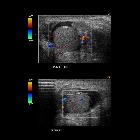Purpura Schönlein-Henoch







IgA vasculitis (formerly known as Henoch-Schonlein purpura (HSP)) is a type of non-thrombocytopenic immune-mediated small vessel acute leukocytoclastic vasculitis.
In order to differentiate from other types of vasculitides, the four commonly adopted diagnostic criteria by the American College of Rheumatology are:
- age of onset less than 20 years (although some case series show disease involvement in older individuals)
- palpable skin purpura
- gastrointestinal bleeding
- intussusception, typically ileoileal
- biopsy showing granulocytes around small arteriolar/venular walls
Epidemiology
It tends to occur in the pediatric population (peak incidence 3-10 years) . IgA vasculitis is the most common type of vasculitis in children .
Pathology
There is the deposition of IgA immune complexes in small vessels.
Distribution
Commonest organ systems which get involved are:
- skin: 95-100%, usually the first organ to get involved
- gastrointestinal tract: 50-75%
- joints: ~80%
- kidneys
Rare sites:
- central nervous system
Radiographic features
Gastrointestinal tract
Plain radiograph
May show evidence of bowel wall thickening due to hemorrhage and/or evidence of bowel obstruction. Plain film features are however non-specific.
Fluoroscopy
Small bowel follow-through may show evidence of separation of bowel loops, "thumbprinting" and/or mucosal thickening.
CT
May show multifocal bowel thickening, lymphadenopathy, mesenteric edema and vascular engorgement. Although non-specific, CT findings may aid in the diagnosis of IgA vasculitis in a young patient with acute gastrointestinal illness along with other, e.g. cutaneous features of IgA vasculitis. Intussusception, typically ileoileal type, is also seen.
Ultrasound
Echogenic kidneys, target or doughnut sign in case of intussusception. IgA vasculitis has also been shown to cause massive scrotal edema and can be a source of severe pain in young boys .
Treatment and prognosis
The disease is self-limiting in most instances. Treatment is usually supportive including fluids and pain relief in the pediatric population. Steroids are used in adults due to the risk of serious renal involvement .
Complications
Gastrointestinal tract
- small bowel intussusception
- small bowel obstruction
- small bowel infarction: 3-5%
- bowel perforation
Renal
History and etymology
It is named after Eduard Heinrich Henoch, German pediatrician (1820-1910) and Johann Lukas Schönlein, German physician (1793-1864).
Differential diagnosis
On a CT/contrast study for the bowel consider:
Siehe auch:
- Morbus Crohn
- Vaskulitis
- Chronisch-entzündliche Darmerkrankungen
- Myositis
- ischämische Kolitis
- hämorrhagischer Dünndarminfarkt
- primäres Dünndarmlymphom
- Vaskulitis bei Kindern
und weiter:
- Dünndarmileus
- Schockdarm
- Ileitis terminalis
- Milchglasverschattungen
- Epistaxis
- CT Hypotensionskomplex
- intermittent intussusception in Henoch-Scholein Purpura
- Dünndarmbeteiligung bei Purpura Schönlein-Henoch
- small bowel folds (differential diagnoses)
- Kutane leukozytoklastische Angiitis
- idiopathisches akutes Skrotalödem
- Vaskulitis im Gastrointestinaltrakt

 Assoziationen und Differentialdiagnosen zu IgA-Vaskulitis:
Assoziationen und Differentialdiagnosen zu IgA-Vaskulitis:





